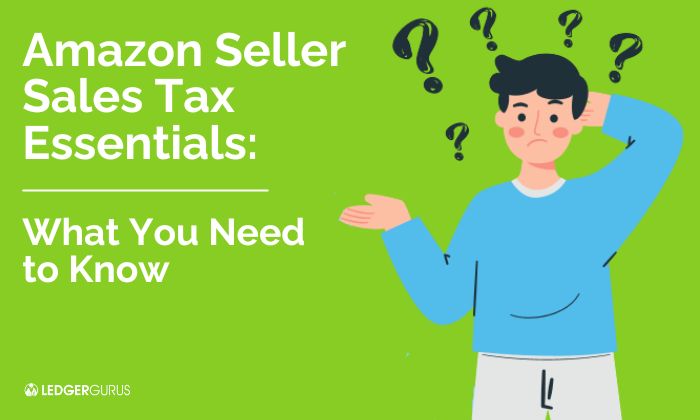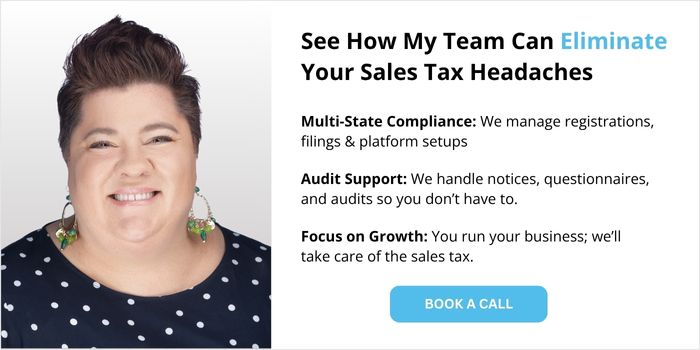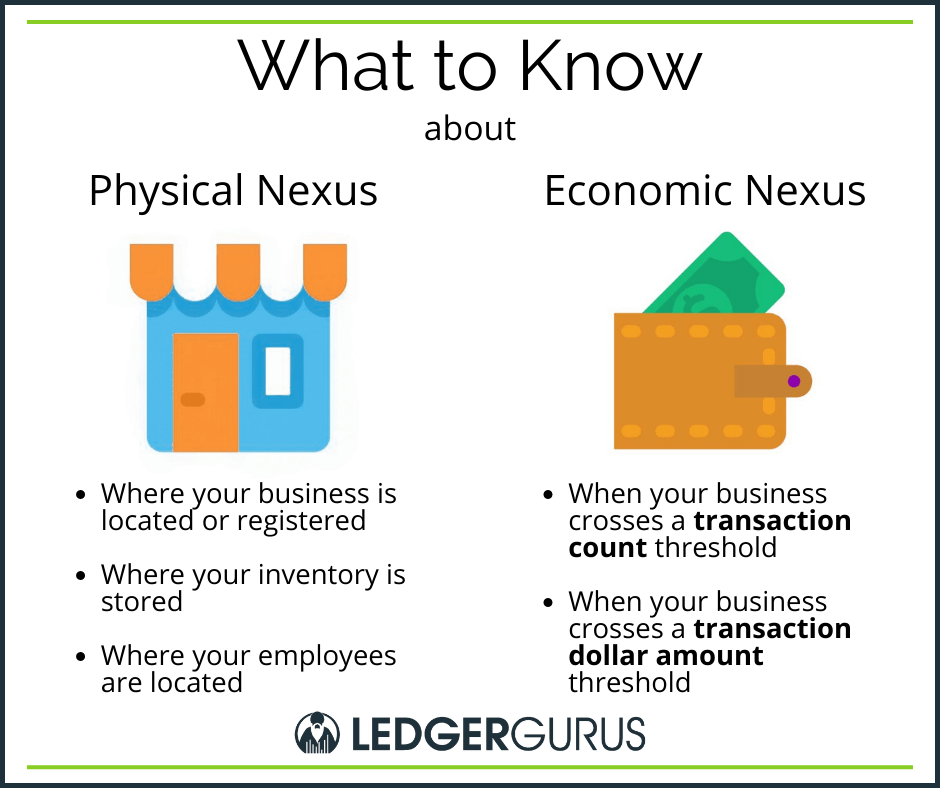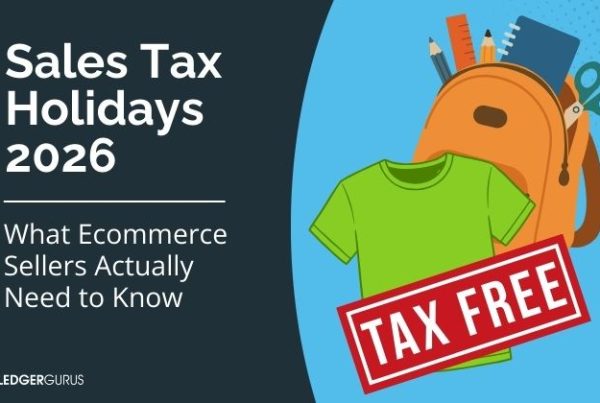As an Amazon seller, are you wondering what your sales tax obligations are? LedgerGurus explains all you need to know.

In this blog, we’ll cover:
- Sales tax liabilities for Amazon sellers
- What Amazon sellers should do about sales tax
- How Amazon FBA inventory and sales tax nexus are connected
- How Amazon sellers can get help with sales tax
As accountants who primarily work with ecommerce businesses on platforms such as Amazon and Shopify, we have the experience you need to answer your sales tax questions.
 Key Takeaways
Key Takeaways
- Marketplace Facilitator laws simplify your sales tax obligations. Amazon’s role as a marketplace facilitator means that they handle sales tax collection, reducing the burden on sellers.
- Know your reporting requirements. While Amazon may handle tax collection, sellers might still have reporting responsibilities, especially in their home state or in states where they have “nexus” due to inventory stored in Amazon warehouses.
- We offer resources for every sales tax need: Whether you’re handling taxes yourself, need a bit of guidance, or want a full-service solution, there are resources and services available to match the complexity of your tax needs as an Amazon seller.
Sales Tax Liabilities for Amazon Sellers
Does Amazon Collect Sales Tax for Me?
This is the first and most important question.
As an online retailer, you may be wondering if Amazon is responsible to collect sales tax for you, the seller.
Amazon is a marketplace facilitator, so, yes. By law, it is required to calculate, collect, and remit sales tax on behalf of sellers like yourself.
What is a marketplace facilitator?
It’s just a nifty way of saying that Amazon is a marketplace that contracts with and sells other businesses’ goods. In these contractual relationships, the marketplace facilitator becomes responsible for calculating, collecting, and remitting sales tax on behalf of the seller.
Most states require sales tax collection on the state level. They may also require collection on up to 3 other levels, and these are listed on Amazon’s combined sales tax report:
- State
- County
- City
- Special district
Amazon automatically calculates the sales tax that is required for your state. So, the sales tax that a customer sees on their end will be one lump amount, but Amazon knows exactly how much is being collected for the various levels.
How You Benefit from Marketplace Facilitator Laws
States with marketplace facilitator sales tax laws categorize Amazon (or other marketplaces, such as Etsy, eBay, Walmart, etc.) as one retailer, so anything sold under the Amazon umbrella must be accounted for. So, every month Amazon files a return that includes its own sales, as well as sellers’ sales to customers within the respective state.
For example, your California sales will be included on Amazon’s monthly return filed with California.
Lumping all sales on a marketplace into a single, monthly return to each state makes it easier for sellers and for the state to process. (Phew! At least one piece of this is easier now.)
Since Amazon files a return for the state each month, you do not have a calculation, collection, or remittance liability.
However, you may have a reporting liability once you have nexus in a state.
What Amazon Sellers Should Do About Sales Tax
While you do not have to calculate, collect, and remit sales tax as an Amazon seller, there are still action steps you should take.
Step 1 – Familiarize yourself with which states have marketplace facilitator tax laws.
Stay up to date with Marketplace Tax Collection on Amazon. Note that things can change over time, so it’s important to revisit this information periodically.
For your information, all 45 states with state sales tax laws also have marketplace facilitator laws in place, with Missouri being the last to come on board. This makes things SO much easier for marketplace-only sellers than they were before!
Where You May Have Reporting Liability
- To your HOME STATE
You are physically located in state XYZ, so you are required to register for a sales tax permit for the state in which you live.
(The exceptions are Alaska, Delaware, Montana, New Hampshire, and Oregon, which do not have state sales tax laws, though certain jurisdictions in Alaska DO have sales tax laws.)
As such, you will need to file returns in your home state. But you can file $0 returns because all the sales are through the Amazon marketplace, resulting in zero taxable sales for you.
For information on how to file a $0 return, watch this video:
- If you use Fulfillment By Amazon (FBA) warehousing
Some Amazon sellers question whether the use of an FBA warehouse in state XYZ translates to mean that you have a significant physical presence, or nexus, in that state.
If you’re wondering if you have to file in all the states where your products are stored, the answer depends on which state.
About 50% of states declare that yes, having inventory in a third-party warehouse does create a physical presence, so you are required to register and report sales taxes with the state.
The other half of the states do not require you to file because you don’t control where your inventory is stored before its sale.
Your Amazon reports can tell you where your inventory is housed. You can use that information to determine whether or not you have reporting liability.
Be aware that some states are actively pursuing FBA sellers on their income tax liability. Those states are:
- Pennsylvania
- Wisconsin
If you store inventory in FBA warehouses in either state, consult with your accountant to determine the best course of action regarding income tax.
Step 2 – Register for sales tax permits, as needed.
Even if you sell through Amazon, you still need to have a sales tax permit in states where you have nexus.
NOTE – If you sell through a non-marketplace channel, you’ll have to add all your sales from all your channels to accurately determine nexus. For more information, read Sales Tax Nexus – What Online Sellers Need to Know.
We have LOTS of resources to help you with that, but the easiest place to start is our 10 Steps of Sales Tax guide. It is a list of the 10 steps you need to be aware of with your sales tax, complete with lots of explanations and resources for more information.
By the way, doing a complete nexus analysis is one of the services we can provide.
How Amazon FBA Inventory and Sales Tax Nexus are Connected
As you can tell, nexus is definitely a crucial topic for online sellers to get super clear on. This is probably one of the areas we get the most questions about on our YouTube channel.
It can seem straightforward and you’ll think you’ve got it, and then it can get complicated again. That’s because states have different laws. What creates nexus in one state may not be the same in another state.
There are several ways to create nexus that apply for ecommerce businesses:
- Economic nexus – You may have nexus in a state where you have a significant number of sales (in terms of revenue and/or number of transactions). See the appendix in our 10 Steps sales guide to see what those thresholds are in each state.
- Physical nexus – You will have nexus in states where you have a physical presence. This commonly includes office buildings, where employees and salespersons live, and where inventory is housed. (Think PEOPLE and PROPERTY.)
Like we said earlier, it’s important to remember that you may have nexus in states where your inventory is stored. This includes FBA sellers.
Many FBA sellers forget to consider their inventory location(s) when determining sales tax nexus.
And remember, if you sell on your own sales channels besides Amazon, you need to collect and remit for all states where you have nexus.
This may be a scary thought, but keep reading. We have LOTS of resources for you at the bottom of this article. LOTS!
How to Find Where Amazon is Holding Your Inventory
To find out where Amazon is holding your inventory, you will want to find the “Inventory Event Detail” report in Seller Central. This link will take you directly there, after logging in. As of this blog writing, you can also follow these steps after signing into Seller Central:
- Reports
- Fulfillment
- Inventory Event Detail
- Download the report for easier navigation. Choose a date range as far back as you would like to consider.
- Once downloaded, find the column titled “fulfillment-center-id.”
- Click the drop-down on the filter for this column. These are all the warehouse locations in which your inventory is stored.
- The first 3 letters of each “id” are associated with an airport. For example, “PHX3” would be a warehouse close to Phoenix, AZ. You would therefore have a nexus in Arizona. Find a complete list of warehouse ids and locations here.
Sales tax tools, such as TaxJar or Avalara, will also help identify where you have nexus due to FBA. We have a comparison article here for different sales tax tools.
How Amazon Sellers Can Get Help with Sales Tax
To sum up, if you’re selling exclusively on Amazon, Amazon (or any other marketplace) is taking care of your sales tax in all states that require sales tax. Your liability for collecting and remitting sales tax is ZERO.
You might need to file a zero-dollar return in your home state, and you may need to register in the states where your inventory is stored, especially if that state has income tax liability. Regardless of income tax liability in FBA states, though, your sales tax exposure is still ZERO.
Next Steps
So, here’s the deal. Even though selling on marketplaces makes things really easy in terms of sales tax for sellers, there are other considerations:
- Registering in states where you have physical or economic nexus
- Filing $0 returns in those states
- Selling on other channels
Sales tax can be really complicated. That’s why we’ve created so many resources to make the process easier to understand for you. Those resources fall in several categories:
- DIY (with guidance)
- Do it WITH you
- Do it FOR you
Do It Yourself
If your business is still fairly small (less than $1 in annual revenue), it’s unlikely that you have nexus in very many states. It is still doable for you to do it yourself, though you probably have lots of questions.
To help you, we have:
- Sales tax consultations – 1-hour consultations with one of our sales tax experts in which you can ask all your questions. They can answer questions, guide you through confusing processes, talk you through registrations or filing returns, and almost anything else you can throw at them.
- Blogs – We’ve written a plethora of articles on all the aspects of sales tax.
- YouTube videos – We’ve also made A LOT of videos with tutorials and screen shares.
Do It WITH You
If you’re getting big enough that you have nexus in several states, or if you are still small but you want one place to learn the entire process from start to finish, so you know exactly what to expect, you may want to check out our sales tax masterclass.
It is a free 45-minute masterclass that will show you what to expect from the entire sales tax process from beginning to end. We answer many of the most commonly asked questions, and give you 3 Big Don’ts for what NOT to do when you’re setting up your sales tax.
Do It FOR You
If you’re just ready for someone else to take care of all this headache and mess for you, we are happy to do that, too. We have services for small companies with nexus in only a few states up to large companies with complex filings in every state. Let us take care of it, so you can focus on what you do best – running your business.
Because we’ve never met a business owner yet who was stoked about doing their sales tax! Nope, not one!







